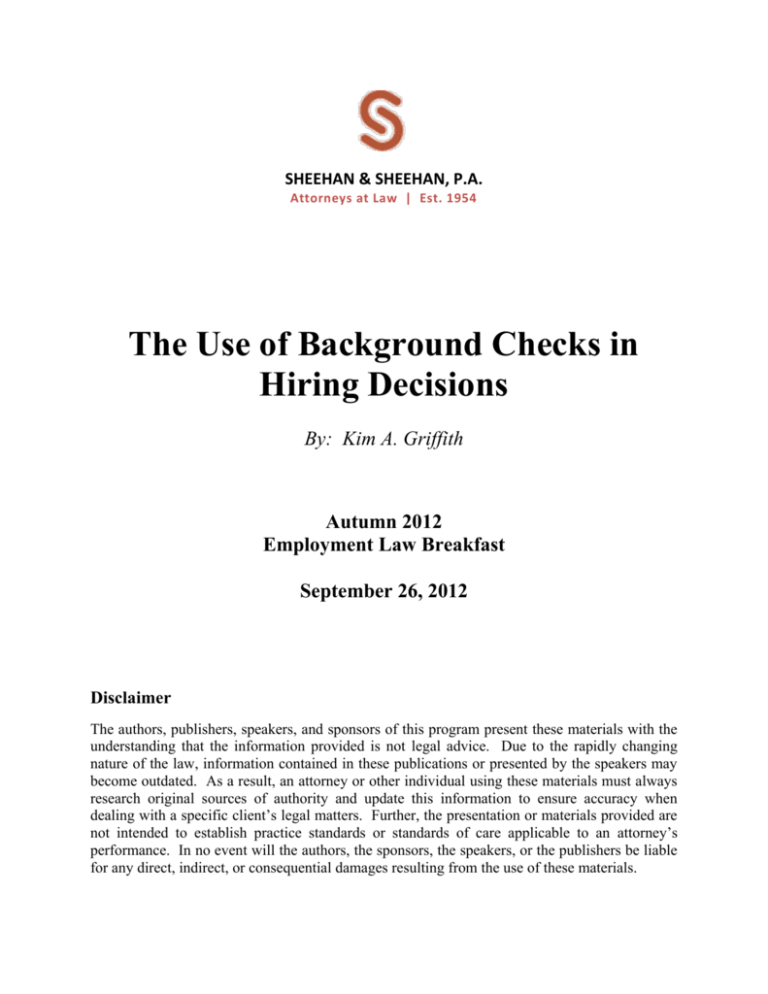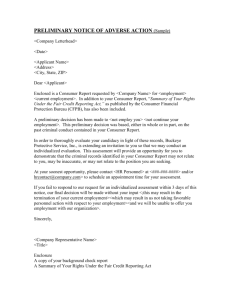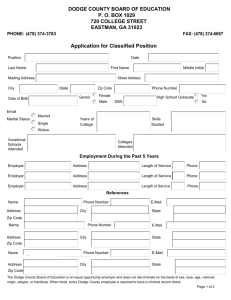09/26/12 S&S The Use of Background Checks in Hiring Decisions
advertisement

SHEEHAN & SHEEHAN, P.A. Attorneys at Law | Est. 1954 The Use of Background Checks in Hiring Decisions By: Kim A. Griffith Autumn 2012 Employment Law Breakfast September 26, 2012 Disclaimer The authors, publishers, speakers, and sponsors of this program present these materials with the understanding that the information provided is not legal advice. Due to the rapidly changing nature of the law, information contained in these publications or presented by the speakers may become outdated. As a result, an attorney or other individual using these materials must always research original sources of authority and update this information to ensure accuracy when dealing with a specific client’s legal matters. Further, the presentation or materials provided are not intended to establish practice standards or standards of care applicable to an attorney’s performance. In no event will the authors, the sponsors, the speakers, or the publishers be liable for any direct, indirect, or consequential damages resulting from the use of these materials. The Use of Background Checks in Hiring Decisions By: Kim A. Griffith I. Introduction In order to minimize the risk of negligent hiring claims and assess the overall trustworthiness and qualifications of job applicants, employers should at a minimum thoroughly check a job applicant’s references prior to making an offer of employment. More extensive background checks are prudent (and in some cases required by law) where the position in question requires significant contact with the public, responsibility for the security or safety of third parties, handling money or sensitive information (including electronic data, health information, etc.), or driving in order to perform essential job functions. However, for the reasons discussed below, care must be taken in conducting background checks and using them to make hiring decisions. The use of background checks in the hiring process is a current hot topic in the employment law area as the result of an updated “Enforcement Guidance” document issued by the U.S. Equal Employment Opportunity Commission (“EEOC”) on April 25, 2012 -- entitled “Consideration of Arrest and Conviction Records in Employment Decisions Under Title VII of the Civil Rights Act of 1964.” The document it is not binding on employers; however, because an employer’s use of an individual’s criminal history in making employment decisions may, in some instances, violate Title VII’s prohibition against employment discrimination, it is prudent for employers to be aware of the EEOC’s views on the subject. In addition, other laws, such as the federal Fair Credit Reporting Act (“FCRA”), limit when and how an employer can obtain background information on job applicants. And, to avoid potential liability for negligent hiring, a job applicant’s motor vehicle driving history is an essential component of a background check when the position to be filled will require the employee to drive in order to perform essential job functions. II. Criminal Records The EEOC Guidance document focuses on Title VII employment discrimination based on race and national origin, in light of employers’ increased access to criminal history information and use of that information to screen job applicants. National data reflects that there has been a significant increase in the number of Americans who have had contact with the criminal justice system, which has resulted in a major increase in the number of people with criminal records in the working-age population. Arrest and incarceration rates are particularly high for African American and Hispanic men, who are arrested at a rate 2 to 3 times their proportion of the general population. In light of those statistics, the EEOC is concerned that employers’ use of criminal history in screening applicants may give rise to disparate treatment of individual applicants or have a disparate impact on certain racial and ethnic groups, in particular African Americans and Hispanics. Disparate Treatment. A violation of Title VII may occur when an employer treats criminal history information differently for different candidates, based on their national origin: The EEOC Guidance document uses the example of an employer that rejects an African American applicant based on his criminal record, but hires a similarly-situated White applicant with a comparable criminal record: Both applicants have similar educational backgrounds, skills and work experience. Each pled guilty to charges of possessing and distributing marijuana as high school students. Neither has had any subsequent contact with the criminal justice system. After college they apply for the same job. Based on the outcome of background checks, the White candidate is referred for a followup interview while the African American is not. A company representative takes the position, with respect to the African American candidate, that the company can’t afford to refer “these drug dealer types” to client companies. Title VII prohibits not only employment decisions driven by racial or ethnic animosity, but also decisions infected by stereotyped thinking about criminality – rather than an applicant’s qualifications and suitability for the position. Disparate Impact. A violation of Title VII exists where an employer’s criminal record screening policy or practice disproportionately screens out a Title-VII protected group – such as African Americans or Hispanics – and the employer is not able to demonstrate that the policy or practice is (1) job related for the position in question, and (2) consistent with business necessity. Courts have held that it is discriminatory under Title VII to follow a blanket policy of disqualifying any job applicant with a conviction for any crime other than a minor traffic offense, because such a policy has a disparate impact on groups such as African Americans and Hispanics. Arrest Records. An arrest record standing alone may not be used to deny an employment opportunity, because the fact of an arrest does NOT establish that criminal conduct has occurred. According to the EEOC’s Guidance, a significant number of state and federal court criminal record databases include incomplete criminal records, for example, they may not be up-to-date in recording the final dispositions for significant numbers of arrests. Third-party background screening businesses that sell criminal history information to employers rely on those incomplete court databases, and thus the reports they provide to employers can be inaccurate and misleading. Conviction Records. A record of a conviction will usually serve as sufficient evidence that a person engaged in particular conduct, given the procedural safeguards associated with trials and guilty pleas. However, out-of-date databases and records may continue to report a conviction that was later expunged, or to report as a felony an offense that was subsequently downgraded to a misdemeanor. As a best practice, the EEOC recommends that employers not ask about convictions on job applications and that, if they make such inquiries, the inquiries should be limited to convictions for which exclusion would be job related for the position in question and consistent with business necessity. The EEOC emphasizes the utility of individual assessments by employers when presented with criminal background information on a job applicant. Individualized assessment generally means informing the applicant that he may be excluded from consideration because of past criminal conduct, and giving him the opportunity to provide additional information and context for his past conduct. Such information might include: The specific facts and circumstances surrounding the offense or conduct. Any inaccurate information in the criminal record. Evidence that the individual has performed the same type of work for which he is applying, post-conviction, with no further incidents of criminal conduct. The length and consistency of employment history before and after the offense or conduct. Rehabilitation efforts, for example, education/training. Employment or character references regarding the individual’s fitness for the particular position. Employer Best Practices. The EEOC Guidance document provides the following examples of best practices for employers when considering criminal record information in making employment decisions: Eliminate policies and procedures that exclude people from employment based on any criminal record. Train managers, hiring officials and decision makers about Title VII and its prohibition on employment discrimination. Develop a narrowly-tailored written policy and procedure for screening applicants and employees for criminal conduct: Identify essential job requirements and the actual circumstances under which jobs are performed. Determine specific criminal offenses that may demonstrate unfitness for performing such jobs. Determine the duration of exclusions for criminal conduct based on all available evidence. Include an individualized assessment requirement. Record the justification for the policy and procedures, and keep a record of consultations and research considered in crafting the policy and procedures. Train managers, hiring officials, and decision makers on how to implement the policy and procedures consistent with Title VII. When asking questions about criminal records, limit inquiries to records for which exclusion would be job related for the position in question and consistent with business necessity. Keep information about applicants’ and employees’ criminal records confidential and use it only for the purpose for which it was intended. The Bottom Line: Employers need to be able to show that their policy or procedure with respect to criminal background checks operates to effectively link specific criminal conduct, and its dangers, with the risks inherent in the duties of a particular position. Arrest and Conviction Inquiries by N.M. Governmental Employers. New Mexico law does not prohibit a private employer from asking job applicants about their arrest or conviction record. By contrast, in 2010 New Mexico became a “ban the box” state for purposes of employment with the state or any of its political subdivisions. While a governmental agency may take into consideration a criminal conviction, such a conviction cannot operate as an automatic bar to obtaining public employment. Neither state agencies and departments nor any political subdivision of the state can inquire about a conviction on an initial application for employment. A conviction may only be taken into consideration after the applicant has been selected as a finalist for a position. III. Credit Records Under the federal Fair Credit Reporting Act (FCRA): Businesses that perform background checks for employers are considered “consumer reporting agencies” (CRAs) if they communicate any information bearing on a consumer’s credit worthiness, credit standing, credit capacity, character, general reputation, personal characteristics, or mode of living which is used or expected to be used in whole or part as a factor in establishing the consumer’s eligibility for employment purposes. CRAs may report convictions indefinitely but may not report records of arrests that did not result in entry of a judgment of conviction, where the arrests occurred more than seven years ago (or until the governing statute of limitations has expired, whichever is the longer period). Those reporting restrictions do not apply to individuals who reasonably may be expected to earn $75,000 or more. Before obtaining a background check from a CRA, an employer must provide the job applicant with a “clear and conspicuous disclosure” that such a report will be obtained, and receive the applicant’s written authorization to obtain the report. A sample notification and authorization form accompanies this article. Before an employer denies employment based on information in a credit report, the employer must provide the applicant with a copy of the credit report and a written description of the applicant’s rights under FCRA. Because of technicalities in the statute, employers should review the requirements of FCRA carefully before obtaining a consumer report and consult legal counsel prior to denying employment based on the content of a consumer report. FCRA Enforcement. On August 8, 2012, HireRight Solutions (formerly known as USCIS Commercial Services) – which provides background reports to thousands of employers about prospective and current employees to help companies make employment decisions – agreed to pay the Federal Trade Commission a $2.6 million civil penalty to settle alleged violations of FCRA. The alleged violations, which HireRight Solutions denied, included failure to take reasonable steps to ensure that the reports’ information was current and reflected such updates as expungement of criminal records, and failure to assure the accuracy of the information it provided. It was the first time the FTC has charged an employment background screening firm with violating FCRA. IV. Driving Records For any position that will require the employee to drive in order to perform essential functions of the position (whether using the employee’s own vehicle or a company vehicle), that requirement should be specified in the duties and responsibilities of the job description. Those obtaining interviews for the position should be asked about their driving history, and required to sign an authorization and release form permitting the employer to obtain a copy of their motor vehicle driving records. Any job offer should be made contingent on the results of review of their driving records. If those records reflect any citations for driving while intoxicated (DWI) or driving while under the influence of narcotics (DUI), the employer needs to assess the attendant risk in hiring the individual (taking into consideration any mitigating factors).






